Arguments for and against providing free Covid-19 vaccine
VerifiedAdded on 2022/12/30
|9
|2110
|100
AI Summary
This article discusses the economic theory behind providing the Covid-19 vaccine free of charge and analyzes the arguments for and against this approach. It also explores different methods for the government to cover the cost of the vaccine, along with their pros and cons. Additionally, it examines the concept of moral hazard, the Hayekian knowledge problem, and Niskanen's theory of bureaucracy in relation to the support measures introduced by governments during the pandemic. Finally, it evaluates whether these support measures are justified despite the identified problems.
Contribute Materials
Your contribution can guide someone’s learning journey. Share your
documents today.
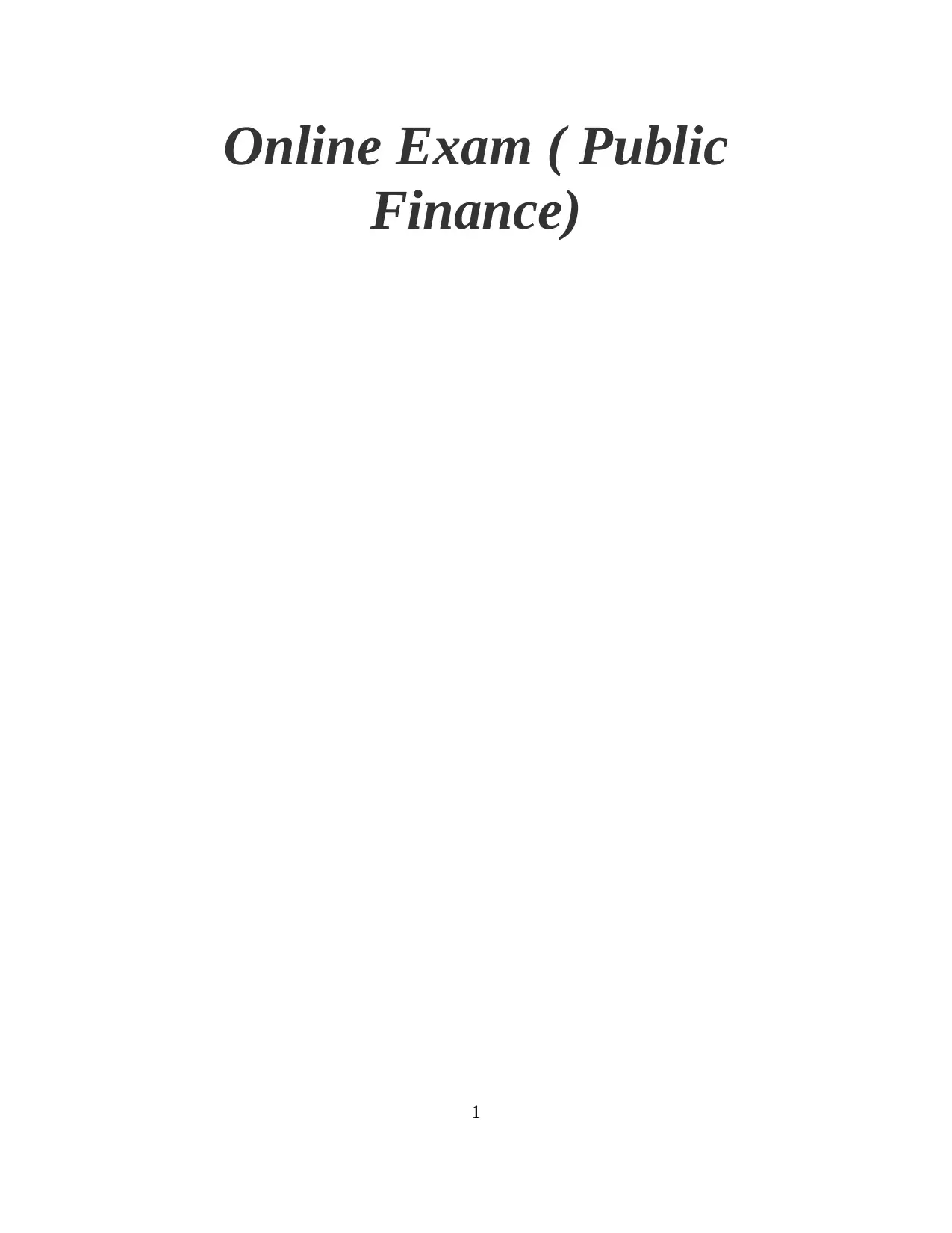
Online Exam ( Public
Finance)
1
Finance)
1
Secure Best Marks with AI Grader
Need help grading? Try our AI Grader for instant feedback on your assignments.
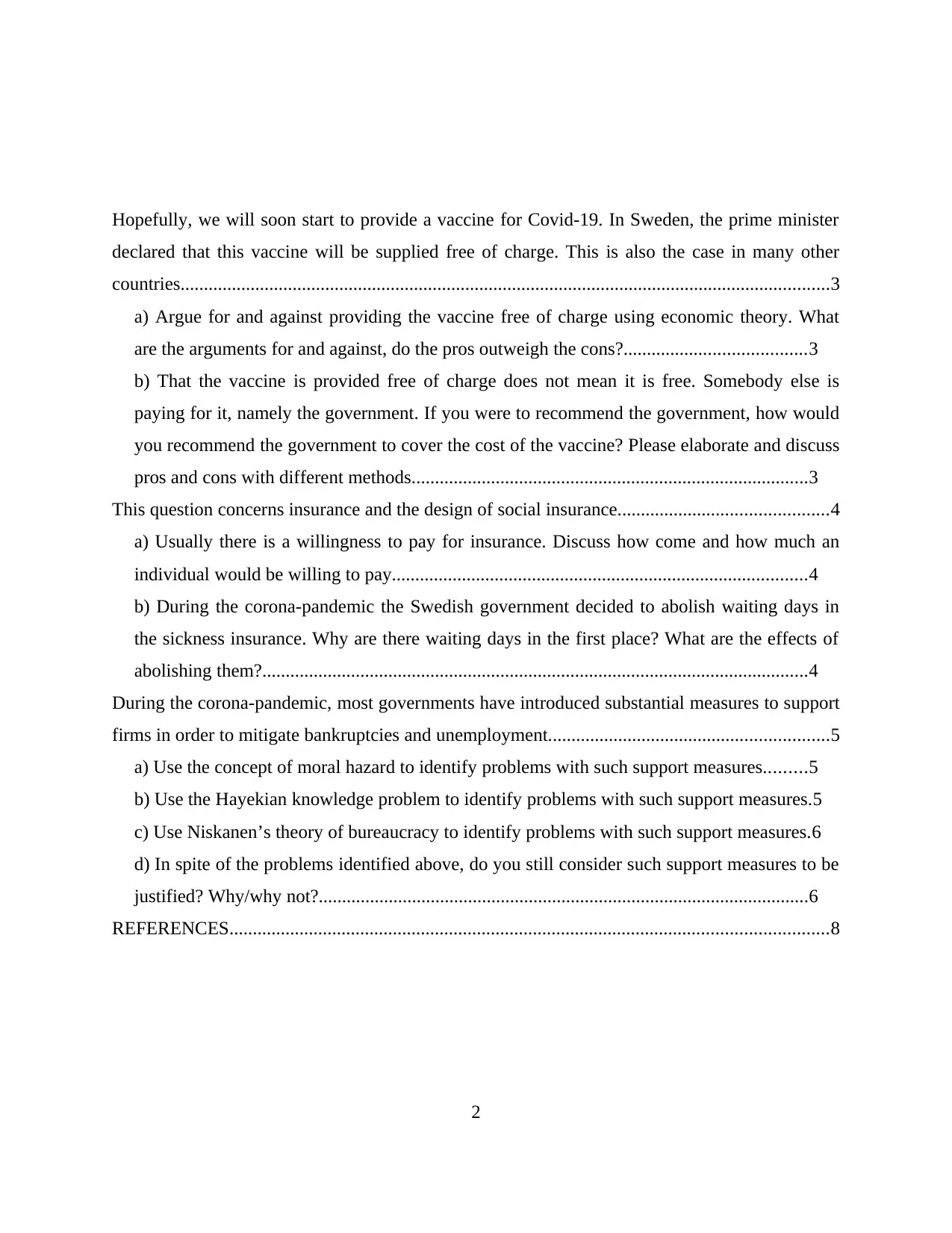
Hopefully, we will soon start to provide a vaccine for Covid-19. In Sweden, the prime minister
declared that this vaccine will be supplied free of charge. This is also the case in many other
countries...........................................................................................................................................3
a) Argue for and against providing the vaccine free of charge using economic theory. What
are the arguments for and against, do the pros outweigh the cons?.......................................3
b) That the vaccine is provided free of charge does not mean it is free. Somebody else is
paying for it, namely the government. If you were to recommend the government, how would
you recommend the government to cover the cost of the vaccine? Please elaborate and discuss
pros and cons with different methods.....................................................................................3
This question concerns insurance and the design of social insurance.............................................4
a) Usually there is a willingness to pay for insurance. Discuss how come and how much an
individual would be willing to pay.........................................................................................4
b) During the corona-pandemic the Swedish government decided to abolish waiting days in
the sickness insurance. Why are there waiting days in the first place? What are the effects of
abolishing them?.....................................................................................................................4
During the corona-pandemic, most governments have introduced substantial measures to support
firms in order to mitigate bankruptcies and unemployment............................................................5
a) Use the concept of moral hazard to identify problems with such support measures.........5
b) Use the Hayekian knowledge problem to identify problems with such support measures.5
c) Use Niskanen’s theory of bureaucracy to identify problems with such support measures.6
d) In spite of the problems identified above, do you still consider such support measures to be
justified? Why/why not?.........................................................................................................6
REFERENCES................................................................................................................................8
2
declared that this vaccine will be supplied free of charge. This is also the case in many other
countries...........................................................................................................................................3
a) Argue for and against providing the vaccine free of charge using economic theory. What
are the arguments for and against, do the pros outweigh the cons?.......................................3
b) That the vaccine is provided free of charge does not mean it is free. Somebody else is
paying for it, namely the government. If you were to recommend the government, how would
you recommend the government to cover the cost of the vaccine? Please elaborate and discuss
pros and cons with different methods.....................................................................................3
This question concerns insurance and the design of social insurance.............................................4
a) Usually there is a willingness to pay for insurance. Discuss how come and how much an
individual would be willing to pay.........................................................................................4
b) During the corona-pandemic the Swedish government decided to abolish waiting days in
the sickness insurance. Why are there waiting days in the first place? What are the effects of
abolishing them?.....................................................................................................................4
During the corona-pandemic, most governments have introduced substantial measures to support
firms in order to mitigate bankruptcies and unemployment............................................................5
a) Use the concept of moral hazard to identify problems with such support measures.........5
b) Use the Hayekian knowledge problem to identify problems with such support measures.5
c) Use Niskanen’s theory of bureaucracy to identify problems with such support measures.6
d) In spite of the problems identified above, do you still consider such support measures to be
justified? Why/why not?.........................................................................................................6
REFERENCES................................................................................................................................8
2
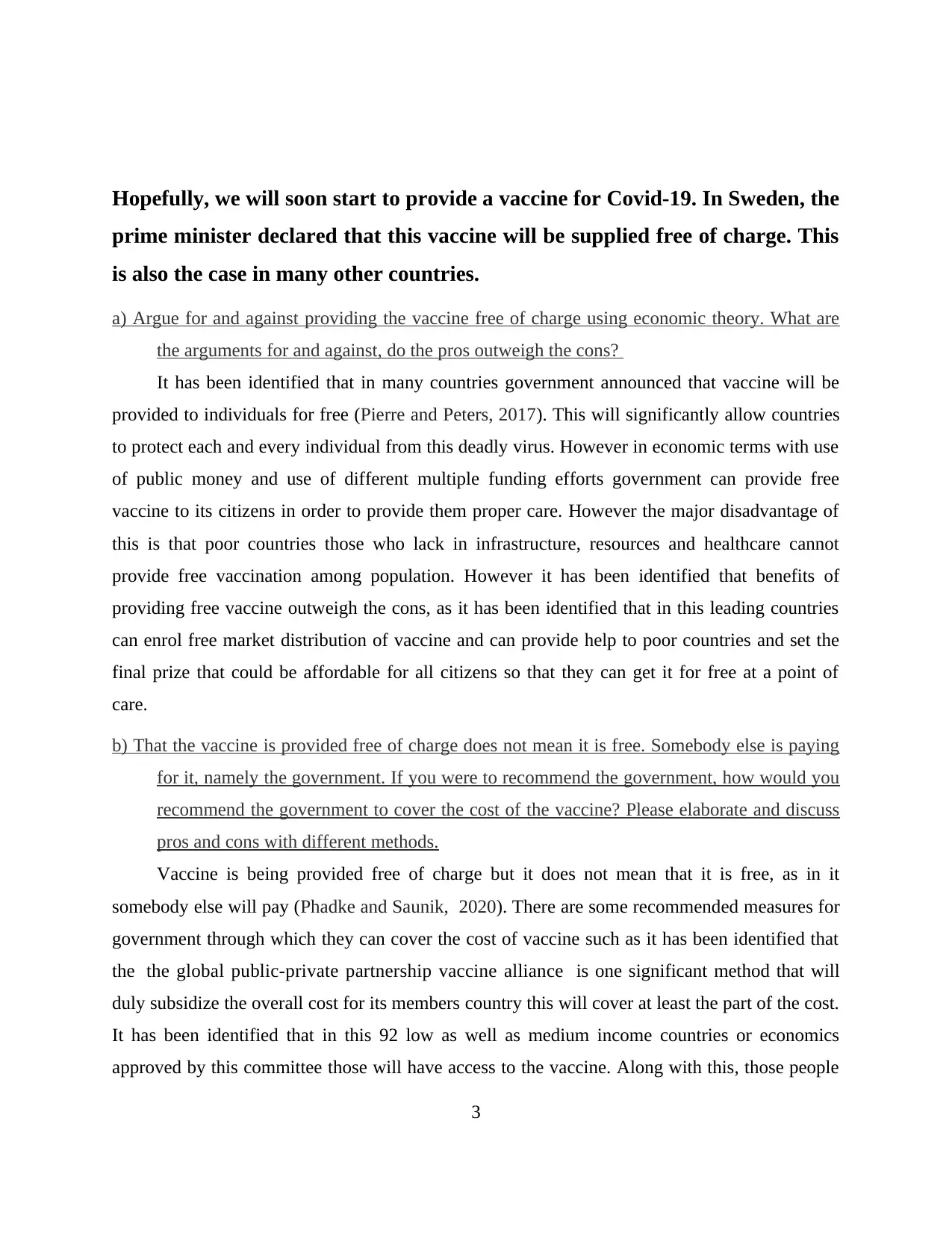
Hopefully, we will soon start to provide a vaccine for Covid-19. In Sweden, the
prime minister declared that this vaccine will be supplied free of charge. This
is also the case in many other countries.
a) Argue for and against providing the vaccine free of charge using economic theory. What are
the arguments for and against, do the pros outweigh the cons?
It has been identified that in many countries government announced that vaccine will be
provided to individuals for free (Pierre and Peters, 2017). This will significantly allow countries
to protect each and every individual from this deadly virus. However in economic terms with use
of public money and use of different multiple funding efforts government can provide free
vaccine to its citizens in order to provide them proper care. However the major disadvantage of
this is that poor countries those who lack in infrastructure, resources and healthcare cannot
provide free vaccination among population. However it has been identified that benefits of
providing free vaccine outweigh the cons, as it has been identified that in this leading countries
can enrol free market distribution of vaccine and can provide help to poor countries and set the
final prize that could be affordable for all citizens so that they can get it for free at a point of
care.
b) That the vaccine is provided free of charge does not mean it is free. Somebody else is paying
for it, namely the government. If you were to recommend the government, how would you
recommend the government to cover the cost of the vaccine? Please elaborate and discuss
pros and cons with different methods.
Vaccine is being provided free of charge but it does not mean that it is free, as in it
somebody else will pay (Phadke and Saunik, 2020). There are some recommended measures for
government through which they can cover the cost of vaccine such as it has been identified that
the the global public-private partnership vaccine alliance is one significant method that will
duly subsidize the overall cost for its members country this will cover at least the part of the cost.
It has been identified that in this 92 low as well as medium income countries or economics
approved by this committee those will have access to the vaccine. Along with this, those people
3
prime minister declared that this vaccine will be supplied free of charge. This
is also the case in many other countries.
a) Argue for and against providing the vaccine free of charge using economic theory. What are
the arguments for and against, do the pros outweigh the cons?
It has been identified that in many countries government announced that vaccine will be
provided to individuals for free (Pierre and Peters, 2017). This will significantly allow countries
to protect each and every individual from this deadly virus. However in economic terms with use
of public money and use of different multiple funding efforts government can provide free
vaccine to its citizens in order to provide them proper care. However the major disadvantage of
this is that poor countries those who lack in infrastructure, resources and healthcare cannot
provide free vaccination among population. However it has been identified that benefits of
providing free vaccine outweigh the cons, as it has been identified that in this leading countries
can enrol free market distribution of vaccine and can provide help to poor countries and set the
final prize that could be affordable for all citizens so that they can get it for free at a point of
care.
b) That the vaccine is provided free of charge does not mean it is free. Somebody else is paying
for it, namely the government. If you were to recommend the government, how would you
recommend the government to cover the cost of the vaccine? Please elaborate and discuss
pros and cons with different methods.
Vaccine is being provided free of charge but it does not mean that it is free, as in it
somebody else will pay (Phadke and Saunik, 2020). There are some recommended measures for
government through which they can cover the cost of vaccine such as it has been identified that
the the global public-private partnership vaccine alliance is one significant method that will
duly subsidize the overall cost for its members country this will cover at least the part of the cost.
It has been identified that in this 92 low as well as medium income countries or economics
approved by this committee those will have access to the vaccine. Along with this, those people
3
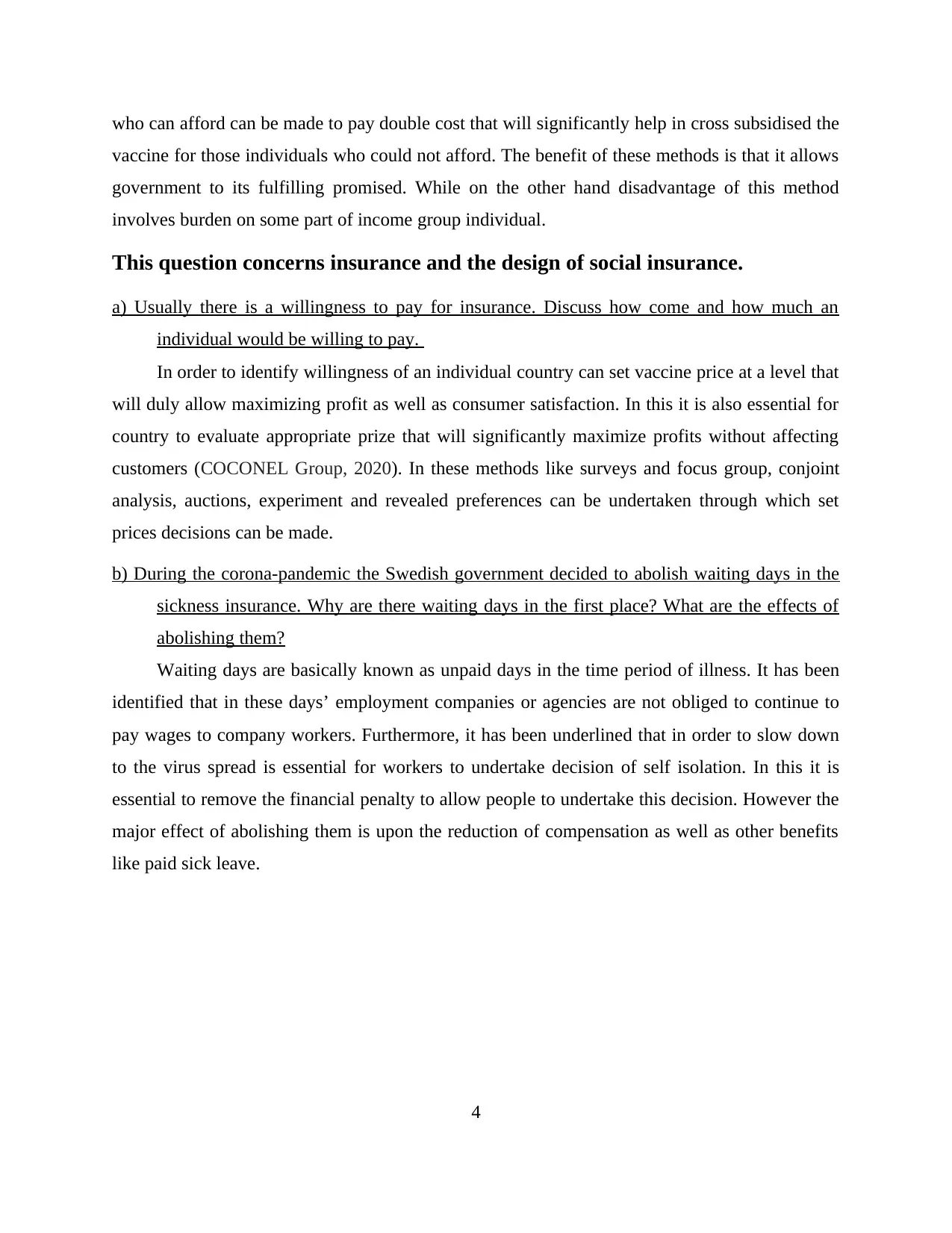
who can afford can be made to pay double cost that will significantly help in cross subsidised the
vaccine for those individuals who could not afford. The benefit of these methods is that it allows
government to its fulfilling promised. While on the other hand disadvantage of this method
involves burden on some part of income group individual.
This question concerns insurance and the design of social insurance.
a) Usually there is a willingness to pay for insurance. Discuss how come and how much an
individual would be willing to pay.
In order to identify willingness of an individual country can set vaccine price at a level that
will duly allow maximizing profit as well as consumer satisfaction. In this it is also essential for
country to evaluate appropriate prize that will significantly maximize profits without affecting
customers (COCONEL Group, 2020). In these methods like surveys and focus group, conjoint
analysis, auctions, experiment and revealed preferences can be undertaken through which set
prices decisions can be made.
b) During the corona-pandemic the Swedish government decided to abolish waiting days in the
sickness insurance. Why are there waiting days in the first place? What are the effects of
abolishing them?
Waiting days are basically known as unpaid days in the time period of illness. It has been
identified that in these days’ employment companies or agencies are not obliged to continue to
pay wages to company workers. Furthermore, it has been underlined that in order to slow down
to the virus spread is essential for workers to undertake decision of self isolation. In this it is
essential to remove the financial penalty to allow people to undertake this decision. However the
major effect of abolishing them is upon the reduction of compensation as well as other benefits
like paid sick leave.
4
vaccine for those individuals who could not afford. The benefit of these methods is that it allows
government to its fulfilling promised. While on the other hand disadvantage of this method
involves burden on some part of income group individual.
This question concerns insurance and the design of social insurance.
a) Usually there is a willingness to pay for insurance. Discuss how come and how much an
individual would be willing to pay.
In order to identify willingness of an individual country can set vaccine price at a level that
will duly allow maximizing profit as well as consumer satisfaction. In this it is also essential for
country to evaluate appropriate prize that will significantly maximize profits without affecting
customers (COCONEL Group, 2020). In these methods like surveys and focus group, conjoint
analysis, auctions, experiment and revealed preferences can be undertaken through which set
prices decisions can be made.
b) During the corona-pandemic the Swedish government decided to abolish waiting days in the
sickness insurance. Why are there waiting days in the first place? What are the effects of
abolishing them?
Waiting days are basically known as unpaid days in the time period of illness. It has been
identified that in these days’ employment companies or agencies are not obliged to continue to
pay wages to company workers. Furthermore, it has been underlined that in order to slow down
to the virus spread is essential for workers to undertake decision of self isolation. In this it is
essential to remove the financial penalty to allow people to undertake this decision. However the
major effect of abolishing them is upon the reduction of compensation as well as other benefits
like paid sick leave.
4
Secure Best Marks with AI Grader
Need help grading? Try our AI Grader for instant feedback on your assignments.
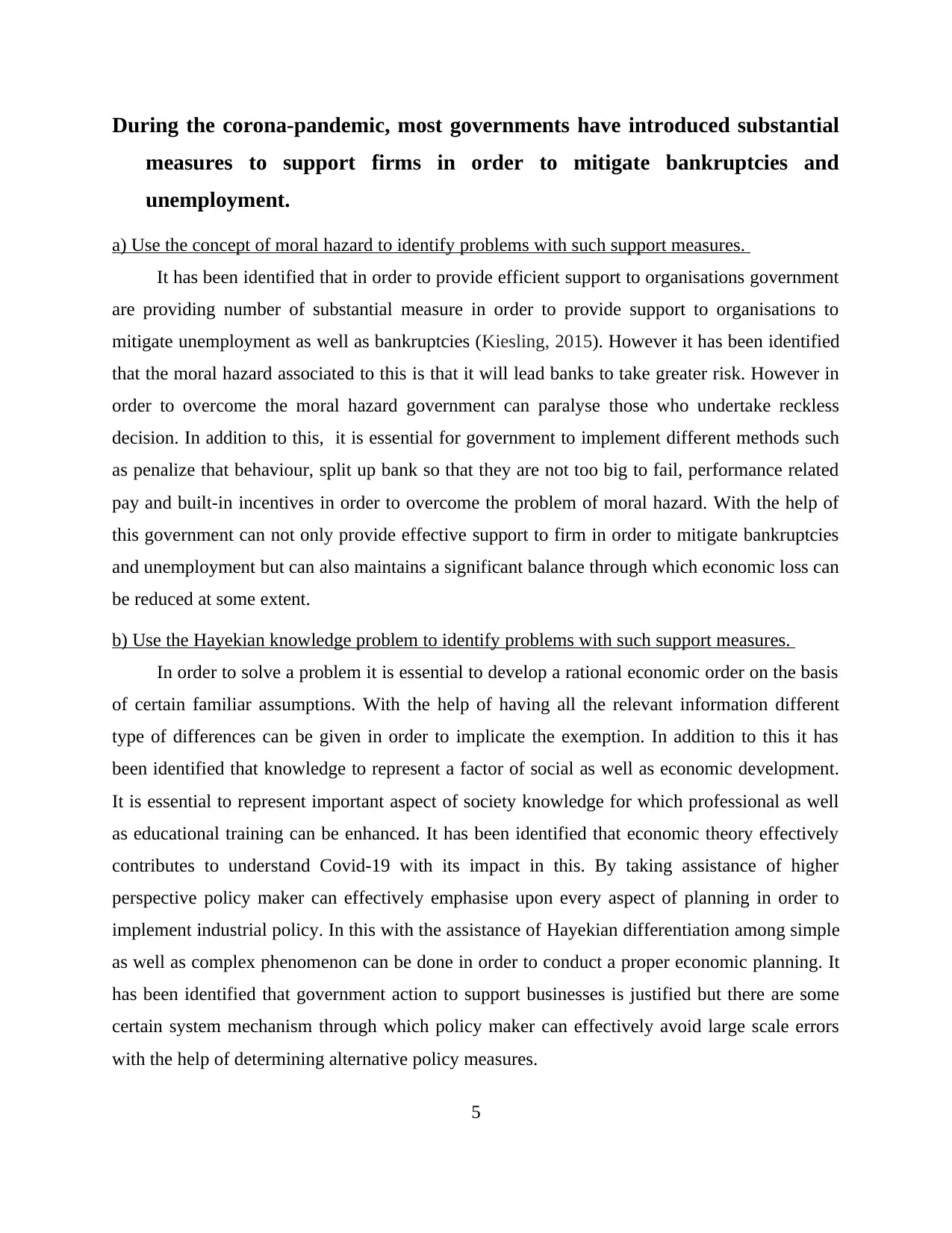
During the corona-pandemic, most governments have introduced substantial
measures to support firms in order to mitigate bankruptcies and
unemployment.
a) Use the concept of moral hazard to identify problems with such support measures.
It has been identified that in order to provide efficient support to organisations government
are providing number of substantial measure in order to provide support to organisations to
mitigate unemployment as well as bankruptcies (Kiesling, 2015). However it has been identified
that the moral hazard associated to this is that it will lead banks to take greater risk. However in
order to overcome the moral hazard government can paralyse those who undertake reckless
decision. In addition to this, it is essential for government to implement different methods such
as penalize that behaviour, split up bank so that they are not too big to fail, performance related
pay and built-in incentives in order to overcome the problem of moral hazard. With the help of
this government can not only provide effective support to firm in order to mitigate bankruptcies
and unemployment but can also maintains a significant balance through which economic loss can
be reduced at some extent.
b) Use the Hayekian knowledge problem to identify problems with such support measures.
In order to solve a problem it is essential to develop a rational economic order on the basis
of certain familiar assumptions. With the help of having all the relevant information different
type of differences can be given in order to implicate the exemption. In addition to this it has
been identified that knowledge to represent a factor of social as well as economic development.
It is essential to represent important aspect of society knowledge for which professional as well
as educational training can be enhanced. It has been identified that economic theory effectively
contributes to understand Covid-19 with its impact in this. By taking assistance of higher
perspective policy maker can effectively emphasise upon every aspect of planning in order to
implement industrial policy. In this with the assistance of Hayekian differentiation among simple
as well as complex phenomenon can be done in order to conduct a proper economic planning. It
has been identified that government action to support businesses is justified but there are some
certain system mechanism through which policy maker can effectively avoid large scale errors
with the help of determining alternative policy measures.
5
measures to support firms in order to mitigate bankruptcies and
unemployment.
a) Use the concept of moral hazard to identify problems with such support measures.
It has been identified that in order to provide efficient support to organisations government
are providing number of substantial measure in order to provide support to organisations to
mitigate unemployment as well as bankruptcies (Kiesling, 2015). However it has been identified
that the moral hazard associated to this is that it will lead banks to take greater risk. However in
order to overcome the moral hazard government can paralyse those who undertake reckless
decision. In addition to this, it is essential for government to implement different methods such
as penalize that behaviour, split up bank so that they are not too big to fail, performance related
pay and built-in incentives in order to overcome the problem of moral hazard. With the help of
this government can not only provide effective support to firm in order to mitigate bankruptcies
and unemployment but can also maintains a significant balance through which economic loss can
be reduced at some extent.
b) Use the Hayekian knowledge problem to identify problems with such support measures.
In order to solve a problem it is essential to develop a rational economic order on the basis
of certain familiar assumptions. With the help of having all the relevant information different
type of differences can be given in order to implicate the exemption. In addition to this it has
been identified that knowledge to represent a factor of social as well as economic development.
It is essential to represent important aspect of society knowledge for which professional as well
as educational training can be enhanced. It has been identified that economic theory effectively
contributes to understand Covid-19 with its impact in this. By taking assistance of higher
perspective policy maker can effectively emphasise upon every aspect of planning in order to
implement industrial policy. In this with the assistance of Hayekian differentiation among simple
as well as complex phenomenon can be done in order to conduct a proper economic planning. It
has been identified that government action to support businesses is justified but there are some
certain system mechanism through which policy maker can effectively avoid large scale errors
with the help of determining alternative policy measures.
5
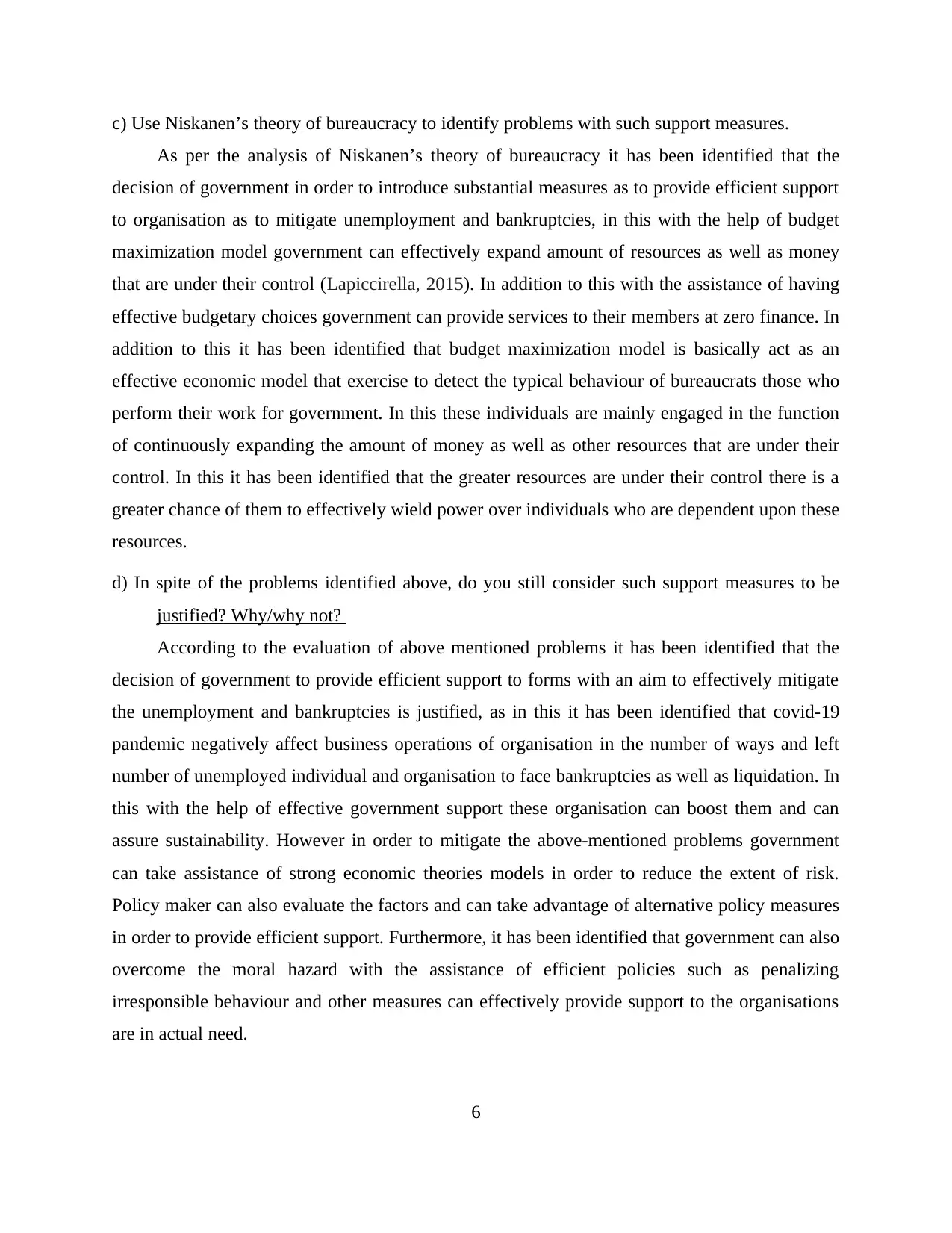
c) Use Niskanen’s theory of bureaucracy to identify problems with such support measures.
As per the analysis of Niskanen’s theory of bureaucracy it has been identified that the
decision of government in order to introduce substantial measures as to provide efficient support
to organisation as to mitigate unemployment and bankruptcies, in this with the help of budget
maximization model government can effectively expand amount of resources as well as money
that are under their control (Lapiccirella, 2015). In addition to this with the assistance of having
effective budgetary choices government can provide services to their members at zero finance. In
addition to this it has been identified that budget maximization model is basically act as an
effective economic model that exercise to detect the typical behaviour of bureaucrats those who
perform their work for government. In this these individuals are mainly engaged in the function
of continuously expanding the amount of money as well as other resources that are under their
control. In this it has been identified that the greater resources are under their control there is a
greater chance of them to effectively wield power over individuals who are dependent upon these
resources.
d) In spite of the problems identified above, do you still consider such support measures to be
justified? Why/why not?
According to the evaluation of above mentioned problems it has been identified that the
decision of government to provide efficient support to forms with an aim to effectively mitigate
the unemployment and bankruptcies is justified, as in this it has been identified that covid-19
pandemic negatively affect business operations of organisation in the number of ways and left
number of unemployed individual and organisation to face bankruptcies as well as liquidation. In
this with the help of effective government support these organisation can boost them and can
assure sustainability. However in order to mitigate the above-mentioned problems government
can take assistance of strong economic theories models in order to reduce the extent of risk.
Policy maker can also evaluate the factors and can take advantage of alternative policy measures
in order to provide efficient support. Furthermore, it has been identified that government can also
overcome the moral hazard with the assistance of efficient policies such as penalizing
irresponsible behaviour and other measures can effectively provide support to the organisations
are in actual need.
6
As per the analysis of Niskanen’s theory of bureaucracy it has been identified that the
decision of government in order to introduce substantial measures as to provide efficient support
to organisation as to mitigate unemployment and bankruptcies, in this with the help of budget
maximization model government can effectively expand amount of resources as well as money
that are under their control (Lapiccirella, 2015). In addition to this with the assistance of having
effective budgetary choices government can provide services to their members at zero finance. In
addition to this it has been identified that budget maximization model is basically act as an
effective economic model that exercise to detect the typical behaviour of bureaucrats those who
perform their work for government. In this these individuals are mainly engaged in the function
of continuously expanding the amount of money as well as other resources that are under their
control. In this it has been identified that the greater resources are under their control there is a
greater chance of them to effectively wield power over individuals who are dependent upon these
resources.
d) In spite of the problems identified above, do you still consider such support measures to be
justified? Why/why not?
According to the evaluation of above mentioned problems it has been identified that the
decision of government to provide efficient support to forms with an aim to effectively mitigate
the unemployment and bankruptcies is justified, as in this it has been identified that covid-19
pandemic negatively affect business operations of organisation in the number of ways and left
number of unemployed individual and organisation to face bankruptcies as well as liquidation. In
this with the help of effective government support these organisation can boost them and can
assure sustainability. However in order to mitigate the above-mentioned problems government
can take assistance of strong economic theories models in order to reduce the extent of risk.
Policy maker can also evaluate the factors and can take advantage of alternative policy measures
in order to provide efficient support. Furthermore, it has been identified that government can also
overcome the moral hazard with the assistance of efficient policies such as penalizing
irresponsible behaviour and other measures can effectively provide support to the organisations
are in actual need.
6

7
Paraphrase This Document
Need a fresh take? Get an instant paraphrase of this document with our AI Paraphraser
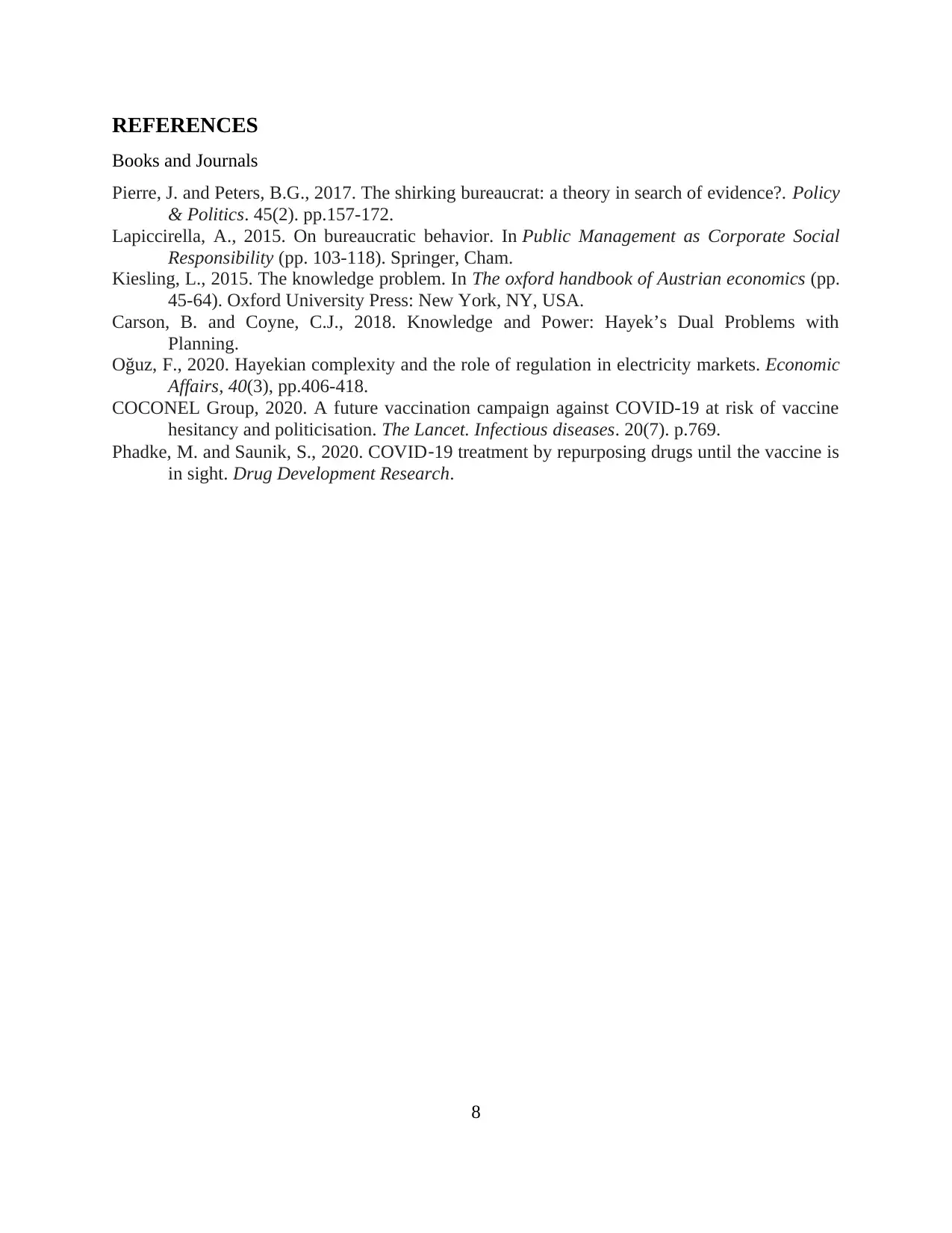
REFERENCES
Books and Journals
Pierre, J. and Peters, B.G., 2017. The shirking bureaucrat: a theory in search of evidence?. Policy
& Politics. 45(2). pp.157-172.
Lapiccirella, A., 2015. On bureaucratic behavior. In Public Management as Corporate Social
Responsibility (pp. 103-118). Springer, Cham.
Kiesling, L., 2015. The knowledge problem. In The oxford handbook of Austrian economics (pp.
45-64). Oxford University Press: New York, NY, USA.
Carson, B. and Coyne, C.J., 2018. Knowledge and Power: Hayek’s Dual Problems with
Planning.
Oğuz, F., 2020. Hayekian complexity and the role of regulation in electricity markets. Economic
Affairs, 40(3), pp.406-418.
COCONEL Group, 2020. A future vaccination campaign against COVID-19 at risk of vaccine
hesitancy and politicisation. The Lancet. Infectious diseases. 20(7). p.769.
Phadke, M. and Saunik, S., 2020. COVID‐19 treatment by repurposing drugs until the vaccine is
in sight. Drug Development Research.
8
Books and Journals
Pierre, J. and Peters, B.G., 2017. The shirking bureaucrat: a theory in search of evidence?. Policy
& Politics. 45(2). pp.157-172.
Lapiccirella, A., 2015. On bureaucratic behavior. In Public Management as Corporate Social
Responsibility (pp. 103-118). Springer, Cham.
Kiesling, L., 2015. The knowledge problem. In The oxford handbook of Austrian economics (pp.
45-64). Oxford University Press: New York, NY, USA.
Carson, B. and Coyne, C.J., 2018. Knowledge and Power: Hayek’s Dual Problems with
Planning.
Oğuz, F., 2020. Hayekian complexity and the role of regulation in electricity markets. Economic
Affairs, 40(3), pp.406-418.
COCONEL Group, 2020. A future vaccination campaign against COVID-19 at risk of vaccine
hesitancy and politicisation. The Lancet. Infectious diseases. 20(7). p.769.
Phadke, M. and Saunik, S., 2020. COVID‐19 treatment by repurposing drugs until the vaccine is
in sight. Drug Development Research.
8

9
1 out of 9
Your All-in-One AI-Powered Toolkit for Academic Success.
+13062052269
info@desklib.com
Available 24*7 on WhatsApp / Email
![[object Object]](/_next/static/media/star-bottom.7253800d.svg)
Unlock your academic potential
© 2024 | Zucol Services PVT LTD | All rights reserved.